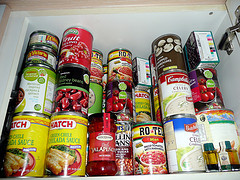Stockpiling Groceries Saves Money And Doesn’t Mean You’re A Crazy Person Image courtesy of (Scorpions and Centaurs)
Guest blogger Cassie over on the personal finance blog Thirty-Six Months makes the case for stockpiles.
- Stockpiles save money. Well, assuming that you only buy items that you use often. Don’t buy shelves full of items that you’ll never use just because they’re too cheap to resist. That’s the opposite of saving money. If you eat, say, a lot of canned soups, filling a shelf with them when they’re on half-off sale makes good financial sense.
- Fewer last-minute trips to the store. Making chili? Forgot that you were out of crushed tomatoes? That wouldn’t happen is you had stocked up when they were ten for $8.
- You’re ready for natural and financial disasters. Having a cabinet or a basement full of food ready to go means that you spend less money in the case of a job loss or other financial setback. Spend months taking your staples from the pantry and only buying fresh vegetables and other perishables. If the unthinkable happens, you’ll have plenty of staples to eat. Not just salt-laden prepared foods, either: think about buying extras of staples like pasta, flour, sugar, canned beans, and grains when they’re on sale or you can find them cheaply.
Grow your own stockpile by starting small. If something you use a lot of is on sale, buy two instead of one and find a vermin-free and secure place to store it. A single shelf or cabinet can work to start. Maybe you’ll eventually build a 6-month supply bunker in the basement (growing up, my couponing mom called our basement “the convenience store”) or just have an extra jar of pickles bought on sale when you need one. Either way, you’re saving more money and you’re more prepared than you were before.
Why You Need a Grocery Stockpile (and How to Grow One) [Thirty-Six Months]
Want more consumer news? Visit our parent organization, Consumer Reports, for the latest on scams, recalls, and other consumer issues.


